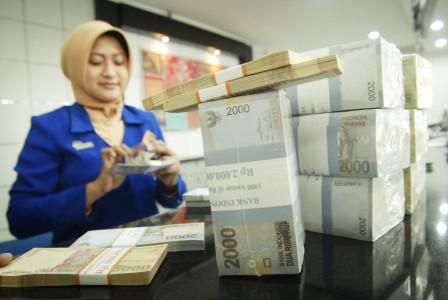Bankers Doubt Indonesia's Liquidity Rules Will Have Desired Effect
Bareksa • 26 Nov 2014

Petugas menghitung pecahan uang yang baru di Bank Rakyat Indonesia (BRI) Kudus, Jateng, Selasa (15/7) - (ANTARA FOTO/Andreas Fitri Atmoko)
Economists expect Indonesia's economic growth to slow down in the next few quarters
Bareksa.com - Looser liquidity rules for banks in Indonesia are unlikely to have the intended effect of boosting lending growth as a simultaneous rise in interest rates at a time when the economy is slowing down will curb credit demand.
The central bank last week said it will count bonds and securities issued by banks, alongside deposits, as part of a lender's loan-to-deposit ratio (LDR), which helps investors assess if a bank is overstretching itself.
The new measure effectively frees up capital for lending because it increases the size of the assets counted as deposits in the LDR.
But while giving with one hand, the Bank Indonesia, the central bank, took away with the other, senior bankers said. It raised its key interest rate by 25 basis points to 7.75 percent, the highest since 2009, to dampen the inflationary impact of a rise in domestic fuel prices.
" will not boost credit because business in general is sluggish. It is not a wise thing to do in such conditions, it's like swimming against the current," Jahja Setiaadtmadja, president director of PT Bank Central Asia, Indonesia's largest bank by market capitalisation, told Reuters.
Economists expect Indonesia's economic growth to slow down in the next few quarters as higher fuel prices drag on consumption. Slower growth is also expected to increase the chances that loans will turn sour.
The central bank is targeting loan growth of 15-17 percent next year, up from a 13-14 percent rise estimated this year.
"Bank Indonesia is trying, amid the slowdown, to push banks not to be passive," Halim Alamsyah, a deputy governor of Bank Indonesia, told reporters after the central bank relaxed liquidity requirements.
LIQUIDITY ISSUE
Bank Indonesia limits bank lending to between 78 percent and 92 percent of deposits. The ratio briefly reached 92.1 percent in July before falling to 88.9 percent in September, central bank data shows.
For PT Bank Internasional Indonesia, the new liquidity calculation would reduce its LDR to 80 percent from 91 percent, said Thila Nadason, finance director at the unit of Malaysia's Malayan Banking Bhd (Maybank).
She said the bank can afford to lend more, but is cautious because of higher interest rates, a weakening rupiah, inflation risks and a new government following the election of President Joko Widodo.
"In the next few months we would be more cautious because we need to see how the economy is settling down," Nadason said. (Source : Reuters)